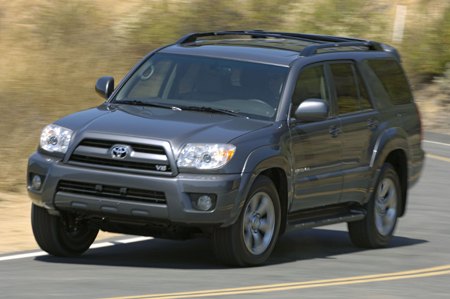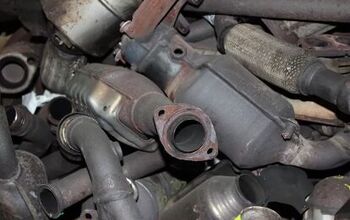IIHS and NHTSA Agree: SUV's Safer Than Cars
So here we are, trying to convince American motorists to abandon their SUV’s for smaller, more fuel-efficient vehicles, to do their bit to reduce global warming and eliminate the need for messy military entanglements. And along comes a scientific study from a reputable independent organization that concludes that you’re safer in an SUV than a passenger car. Nuts.
You remember that debate, don’t you? Back before carbon dioxide was a planet killer, before hurricane Katrina sent the price of gas soaring, before the Iraq war got old, the anti-SUV crowd focused their attention on safety. They highlighted the “us vs. them” SUV vs. car death match, where the guy with the morally indefensible vehicle won the right to play again. Which was unfair but true. And still is.
Last Thursday, the Insurance Institute for Highway Safety (IIHS) released the results of a study examining death rates for drivers of 2001 to 2004 model year vehicles involved in crashes from 2002 through 2005. The results were rated by deaths per million vehicle years (DMVY).
The IIHS’ separated the vehicles into eight categories: cars, sports, luxury, specialty, station wagons, minivans, SUV’s and pickup trucks. The “deaths by body style” stats were conclusive. According to the report, large and mid-sized 4WD vehicles (47 and 59 DMVY) are safer than cars classified as mini (148), small (103), midsize (71), large (81) and very large (61).
The IIHS report also listed the vehicles with the highest and lowest driver death rates. Of the 16 “worst” vehicles rated, cars occupied 12 slots, while SUV’s garnered four places on the list (a 75 / 25 percent split). Of the 15 “best” vehicles, five cars (33 percent), seven SUV’s (47 percent) and three minivans (20 percent) made the grade.
That said, the IIHS study rated both small and very large SUV’s appreciably more deadly than mid-sized and large SUV’s. And there are as many ways to spin interpret the IIHS data as there are media outlets happy to avoid the logical, distinctly non-PC headline “SUV’s Safer than Cars.”
CBS News compared the "death rates in passenger vehicles with similar weight" and came to a different conclusion: "Cars Still Beat SUV's In Safety." The Detroit News report avoided any SUV vs. car comparisons. Reuters touted the Ford F-150’s huge safety gains. Consumer Reports focused on the importance of driver behavior, rather than vehicle design:
“Care should be taken when evaluating this data because there are driver factors (such as demographics and region) that might greatly affect the fatality rates per model. We believe models that appeal to a more careful driver tend to have a lower fatality rate than those that attract a more risk-prone driver.”
While it's easy to understand how the Nissan 350Z made it on the IIHS black list, it’s hard to think of Kia drivers (Spectra fourth, Rio sixth) as “thrill seekers.” No, the simple, unavoidable, inconvenient truth is that both the pro and anti-SUV campaigners were right: physics rule the day.
Corroboration comes via the National Highway Traffic Safety Administration’s (NHSTA) 2005 crash stats. Measuring driver fatalities in all types of crashes, SUV's were 5.2 percent safer than passenger cars. And it’s no fluke. In 2003, SUV’s out-protected cars by 5.3 percent. In 2004, the figure climbed to 6.1 percent. In 2005, it rose to 6.6 percent.
Again, there are many ways to interpret the data. If you measure non-driver fatalities, or rollover crashes, the picture changes. But there’s plenty of evidence to confirm what common sense suggests. In 2005, SUV occupants were twice as safe as passenger car occupants in front, side and rear crashes.
The safety gap is bound to widen. Thanks to rising gas prices and changing consumer tastes, inherently dangerous jumbo-sized SUV’s are either history (e.g. Ford Excursion) or fading fast (e.g. Chevrolet TrailBlazer). Buyers of full-sized SUV’s are migrating towards smaller, lower riding and safer car-based SUV’s (a.k.a. CUV’s). And NHTSA legislation mandating electronic stability control in all SUV’s will yield significant safety gains.
None of this is good news for environmental campaigners, most of whom favor government intervention to “persuade” Americans drivers to exchange their SUV’s for small, frugal and more dangerous vehicles. Still, one should never underestimate the zealot’s power to surmount scientific results. If SUV’s were outlawed, there wouldn’t BE a safety gap. More people will die from global warming than small car crashes. Etc.
To a certain extent, the pro-conservation, anti-SUV crowd has already won this debate, as witnessed by the fact that so few media outlets are willing to raise the safety vs. fuel economy issue. Well, consider it raised.
[Click here for IIHS report or here for USA Today's simplified chart.]
More by Robert Farago
Latest Car Reviews
Read moreLatest Product Reviews
Read moreRecent Comments
- Formula m How many Hyundai and Kia’s do not have the original engine block it left the factory with 10yrs prior?
- 1995 SC I will say that year 29 has been a little spendy on my car (Motor Mounts, Injectors and a Supercharger Service since it had to come off for the injectors, ABS Pump and the tool to cycle the valves to bleed the system, Front Calipers, rear pinion seal, transmission service with a new pan that has a drain, a gaggle of capacitors to fix the ride control module and a replacement amplifier for the stereo. Still needs an exhaust manifold gasket. The front end got serviced in year 28. On the plus side blank cassettes are increasingly easy to find so I have a solid collection of 90 minute playlists.
- MaintenanceCosts My own experiences with, well, maintenance costs:Chevy Bolt, ownership from new to 4.5 years, ~$400*Toyota Highlander Hybrid, ownership from 3.5 to 8 years, ~$2400BMW 335i Convertible, ownership from 11.5 to 13 years, ~$1200Acura Legend, ownership from 20 to 29 years, ~$11,500***Includes a new 12V battery and a set of wiper blades. In fairness, bigger bills for coolant and tire replacement are coming in year 5.**Includes replacement of all rubber parts, rebuild of entire suspension and steering system, and conversion of car to OEM 16" wheel set, among other things
- Jeff Tesla should not be allowed to call its system Full Self-Driving. Very dangerous and misleading.
- Slavuta America, the evil totalitarian police state


































Comments
Join the conversation
Me: Years ago, when I was driving a 1900-some lb ‘77 Toyota Corolla, I did this. I wore a bicycle helmet. Spanish guy: Well, according to those CASR australian safety researchers you did the right thing. They suggest to wear just that, a bicycle helmet. Seems that´s enough to make a difference in case of crash. ME: I found the CASR project very interesting. Would love to be able to get such a device (it would look more discrete than a bicycle helmet) SG: I wonder if side head airbags and/or curtain airbags make the helmet stunt superfluous. ME: Probably superfluous. Maybe even dangerous. If you want to discuss this further, you can email me at dcholzman@aol.com
This from Scorched Earth: RF: As you say the data could be spun any way the media wish. The NHSTA and IIHS data failed to record important data such as deaths from single vehicle crashes, rollovers, etc. And of course the data may have been manipulated. Of course the heavier car will almost always prevail in a head-to-head crash. However, that constitutes only about a third of all fatalities...about a third are also due to rollovers, to which SUV's are extremely prone. I don't really like to trust the NHSTA or IIHS by themselves because there is a tremendous amount of variability and question marks inherent in their tests. The most trustworthy site, IMO, is http://www.informedforlife.org/, which takes NHSTA and IIHS ratings, weight, and stability control into account in its ratings, providing an overall rating applicable to all types of car. They use a sh4tload of data to correlate the ratings to real-life data on fatalities. As you can see on their ranking charts, for the most part cars win out vs. SUV's. But some CUV's like the Honda Pilot and Ford Edge do extremely well, too. Sure, there are some inconsistencies and bugs in the ratings, but for the most part I think Informed for Life does a great job. You should have a look for yourself....